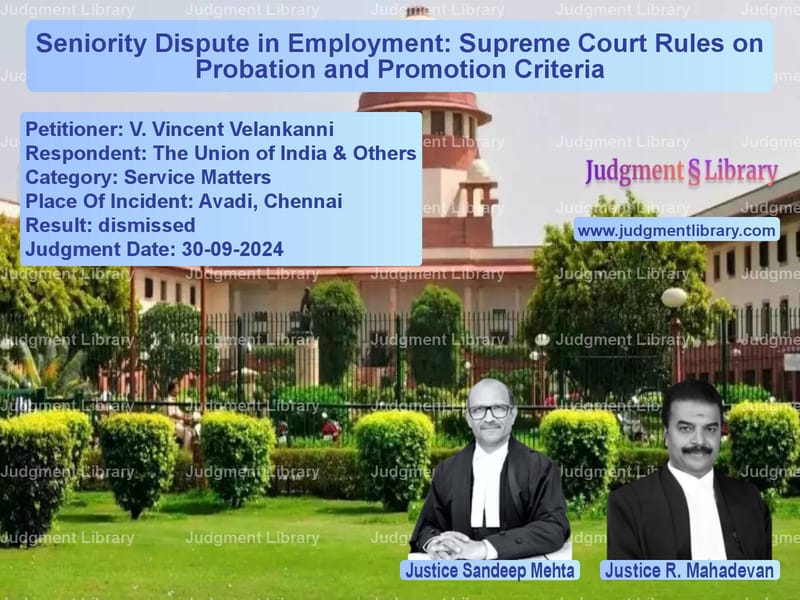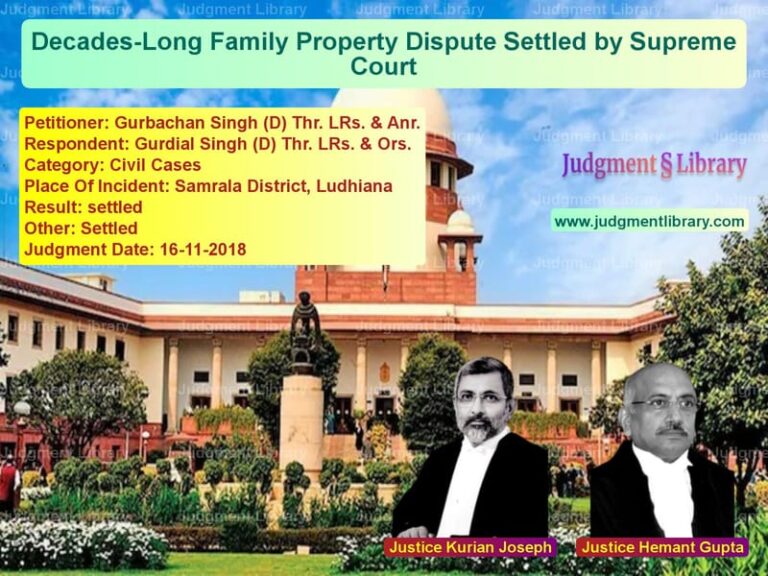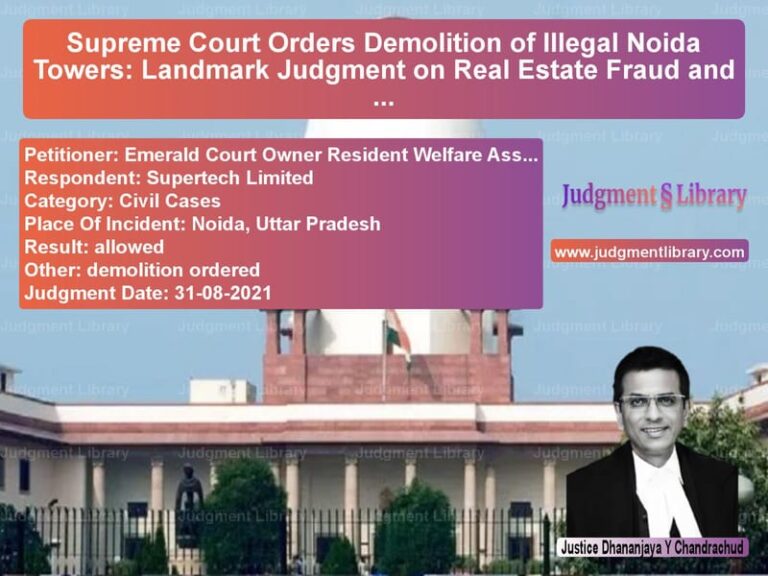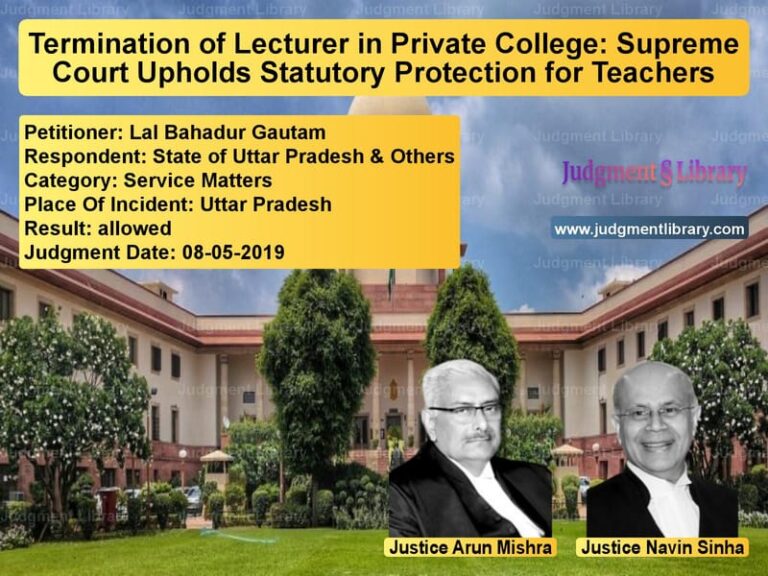Seniority Dispute in Employment: Supreme Court Rules on Probation and Promotion Criteria
The case of V. Vincent Velankanni vs. The Union of India & Others addressed the dispute over seniority among employees in the Engine Factory, Avadi, Chennai. The Supreme Court ruled that the seniority of employees in skilled grade must be determined from the date of promotion, not from the date of initial appointment in the semi-skilled grade.
Background of the Case
The appellant and private respondents were employed in semi-skilled posts such as Fitters and Machinists in the respondent No.2-Factory. A merit-based select list was issued in 1995, placing the appellant higher than the private respondents. The appellant was appointed on January 17, 1996, as a Fitter General (semi-skilled), with an initial probation of two years, later extended by six months.
Upon completing probation, the appellant was promoted to the skilled grade on January 6, 1999. However, a draft seniority list issued on July 28, 2006, ranked the appellant lower than the private respondents, prompting a legal challenge.
Key Legal Issues
- Should seniority be based on the date of initial appointment or the date of promotion to the skilled grade?
- Does extended probation impact seniority ranking?
- Can retrospective application of a later government order alter the existing seniority list?
Arguments by the Appellant
The appellant contended that:
- Seniority should be determined by the order of merit in the initial appointment list.
- Once probation is completed, confirmation should be considered from the date of appointment.
- The trade test was not a mandatory requirement for seniority fixation.
- The Office Memorandum dated November 4, 1992, mandates that seniority should be delinked from confirmation.
Arguments by the Respondents
The respondents countered that:
- Promotion from semi-skilled to skilled grade required passing a trade test.
- The probation period must be satisfactorily completed before confirming an employee.
- The Government Order dated December 24, 2002, specified that seniority should be counted from the date of promotion.
- The August 4, 2015, order cannot be applied retrospectively to change settled seniority positions.
Supreme Court’s Observations
1. Determining Seniority
The Court held that seniority is ordinarily determined from the date of initial appointment, but specific rules can override this principle:
“Where statutory rules prescribe a method for fixing seniority, they take precedence over general principles.”
2. Impact of Extended Probation
The Court noted that the appellant’s extended probation affected his seniority ranking:
“The appellant completed probation and was promoted to the skilled grade after his peers. Thus, seniority must be reckoned from the date of promotion.”
3. Non-Retrospective Effect of the 2015 Order
The Court ruled that the 2015 government order could not be applied retrospectively:
“An executive order cannot have a retrospective effect unless explicitly stated. To reopen settled seniority lists after decades would cause administrative chaos.”
Final Judgment
The Supreme Court dismissed the appeal, affirming the seniority list issued by the Engine Factory:
“The appeal is devoid of merit. Seniority shall be determined from the date of promotion to the skilled grade, not from the date of initial appointment.”
Impact of the Judgment
This ruling has significant implications for employment law and seniority disputes:
- Seniority must align with promotion criteria: Employees cannot claim seniority based on initial appointment if promotions require specific qualifications.
- Probation extensions impact seniority: Failure to complete probation on time affects ranking.
- Government orders cannot disrupt settled seniority retrospectively: Policy changes apply prospectively to avoid legal uncertainty.
- Fairness in employment promotions is upheld: Promotions based on merit and qualification tests ensure transparent career progression.
This decision reinforces that employment seniority is governed by clear, rule-based promotions rather than initial hiring dates.
Petitioner Name: V. Vincent Velankanni.Respondent Name: The Union of India & Others.Judgment By: Justice Sandeep Mehta, Justice R. Mahadevan.Place Of Incident: Avadi, Chennai.Judgment Date: 30-09-2024.
Don’t miss out on the full details! Download the complete judgment in PDF format below and gain valuable insights instantly!
Download Judgment: v.-vincent-velankann-vs-the-union-of-india-&-supreme-court-of-india-judgment-dated-30-09-2024.pdf
Directly Download Judgment: Directly download this Judgment
See all petitions in Employment Disputes
See all petitions in Promotion Cases
See all petitions in Transfers Cases
See all petitions in Judgment by Sandeep Mehta
See all petitions in Judgment by R. Mahadevan
See all petitions in dismissed
See all petitions in supreme court of India judgments September 2024
See all petitions in 2024 judgments
See all posts in Service Matters Category
See all allowed petitions in Service Matters Category
See all Dismissed petitions in Service Matters Category
See all partially allowed petitions in Service Matters Category







